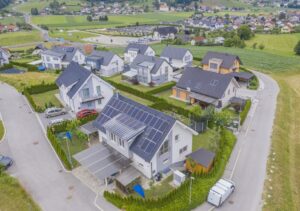Energy Communities
GREEN URBANISM RELATED
TO ENERGY CONSUMPTION

Introduction
For clean energy transition, benefits of local communities are encouraged to be exploited by promoting citizens as “Prosumers”. Instead of being just consumers of energy, local shareholders can associate themselves to produce, distribute, store, and manage energy in the greenest way possible, in order to generate carbon-free energy services to the local community, and be less dependent from external actors.
Description
The main functions of the energy community are energy production, storage, consumption and management. As renewables are the main energy sources, ensuring flexibility is an important challenge which can be addressed by storage facility and demand-responsive energy management systems. Further services like energy efficiency services or charging of electric vehicle might also be offered in the energy community. The collaboration can provide further community-based initiatives like awareness-raising and educational programmes, environmental conversation actions, development of public spaces or supporting vulnerable local residents.
Citizens, municipalities, authorities or small enterprises can cooperate with each other in the energy community on a voluntary basis to provide environmental, economic or social benefits to its members and the local area. Making financial profits cannot be their main intention. Members of the energy communities can take any type of legal form, such as association, NGO or SME. It is important to be able to act as one entity, so all type of members can represent their interests, necessary permits can be required, and sale of electricity can happen. Cities can accelerate the spread of such communities by local initiatives – offering technical and financial support or defining local policies with a target for community-based ownership of renewable energy capacity.

